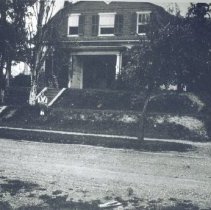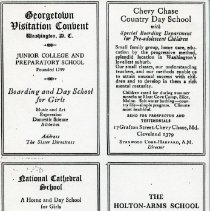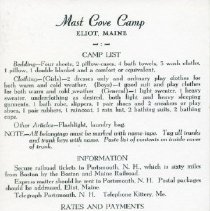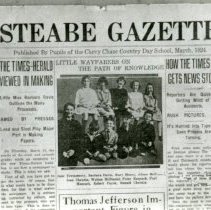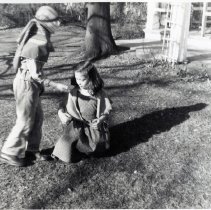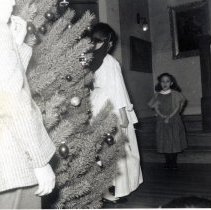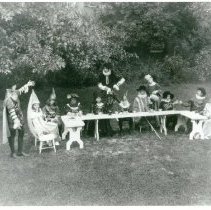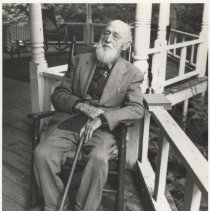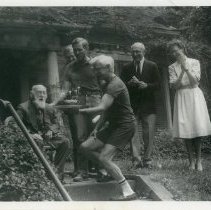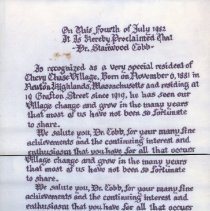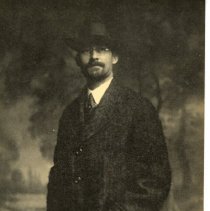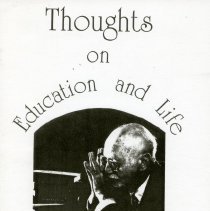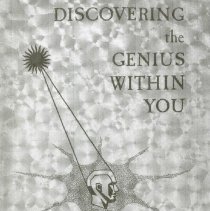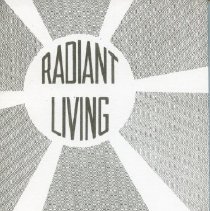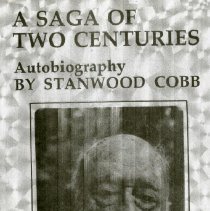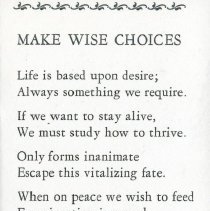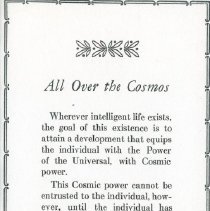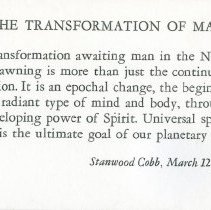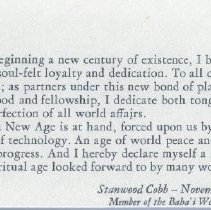Archive Record
| Object ID | 1000.113.01 |
| Title | "Dr. Stanwood Cobb, 1881-1982" |
| Object Name | Exhibit |
| Creator |
Julie Thomas and Susan Elwell |
| Description |
"Dr. Stanwood Cobb, 1881-1982" Exhibit produced by Julie Thomas and Susan Elwell for the Chevy Chase Historical Society. On display at the 2008 CCHS Gala at 19 Grafton Street. "Modern Education for the Modern Child" Chevy Chase Country Day School Photograph (1000.113.01a): 19 Grafton Street circa 1920, Cobb residence as well as site of Chevy Chase Country Day School. Student seated on front steps. Dr. Cobb as founder of the Chevy Chase Country School Dr. Cobb founded the Chevy Chase Country School in 1919 and the first classes were held in the Chevy Chase Village Library (now the CC Village Hall). In 1923, the school was moved to 19 Grafton Street which had been purchased that year by Dr. Cobb and his wife Nayan. Over the years that followed the school was attended by a number of children that lived in Chevy Chase. Dr. Cobb put the ideas that he had developed in his previous teaching experiences to test at his new school. He believed that it was the educator's job to promote a "child centered learning experience." Playing in the outdoors, dancing, and drama were all part of the learning experience at the school on Grafton Street. The ample grounds that surrounded the school house played a critical role in the child's learning process. Dr. Cobb's contributions to education field during the Twenties and Thirties are still evident today every time a child has recess in the D.C. public schools and goes outdoors to play or takes part in a dramatic or musical activity in a primary or secondary setting throughout the United States. "The Chevy Chase Country School is dedicated to the task of bringing out the very best in each individual child...What your child needs today is an educational environment as alive and thrilling to his intelligence and interests as is the out-of-school environment with which the modern scientific age confronts him. Art, music, rhythms, drama, communal sports, coupled with a core curriculum of math and phonetics. Dramatic work is a vital part ...growing natures become aware of their powers and limitations...and are given the tools to implement the forces of their personalities... 'Dr. Cobb is a master ...in the difficult and fascinating problem of giving the child, at once, a free and a disciplined personality.' [Quote from a parent]" (from the school's brochure) Pictures: School Ad and Camp Application (1000.113.01b, c) There was a residency program at Chevy Chase Country Day School as well as a day program where students could have their meals at schools. The school was limited to one hundred pupils. A year round program included "Mast Cove Camp" in Elliott, Maine, also run by the Cobbs. Photographs: Front Page of the "Steabe Gazette" (Chevy Chase Country Day School Newspaper) (2008.116.04) Christmas Play at Chevy Chase Country Day School, featuring Elizabeth Hatziolos (2008.47.05) Christmas play at Chevy Chase Country Day School featuring Elizabeth Hatziolos, Christmas 1957. (2008.47.06) Scene from Shakespeare's "As You Like It" "Our pupils come to love and understand Shakespeare through interpreting him each year to an audience." -Dr. S. Cobb "At some point as a six year old I stopped eating because I was jealous of my 14 month old younger brother, Douglas Irwin Salmon. I was sent to the Chevy Chase Country School as a boarder to learn how to eat again. One of my fellow students had asthma. He only ate rye crisps and bananas. It wasn't the school that taught me to eat again, When I witlessness one of his asthma attacks I started eating again, as I thought that would happen to me if I didn't eat! CCCS was a loving, fun place. I loved living there, playing in the street and on the playground (then the entire lot next door that is now 17 Grafton Street). For day school, we were picked up in a long, black limo driven by Dr, Cobb, sometimes by his wife. My brother and I also attended their camp in Maine." -Eleanor Lynn Salmon (Chartrand) Student, Chevy Chase Country School Photograph (1987.02.01): Dr. Stanwood Cobb on his 100th birthday. 100th Birthday Party For his 100th Birthday, the Board of Supervisors of the Village presented Dr. Cobb with a proclamation extolling his contributions. Much to everyone's delight, Dr. Cobb gave an impromptu speech on our responsibility to work for peace and the danger of nuclear weapons and advocated their elimination. He also mentioned that his relatives had come to America on the Mayflower. A little boy standing in front was heard to remark to a buddy, "Did you hear that! Dr. Cobb came over on the Mayflower. He really is an old guy." -Larry C. Heilman Photographs: 100th Birthday Party: friend of Dr. Cobb, Larry Heilman, John Tuohey, Chevy Chase Village Board Chair Ephraim Jacobs, Mary Anne Tuohey (2008.103.02). Chevy Chase Village Citation for Dr. Cobb's 100th Birthday (1000.113.01d) Dr. Cobb's Origins Dr. Cobb was born on November 6,1881 in Newton, Massachusetts. His father, Darius Cobb, was a veteran of the Civil War and a direct descendent of Elder Cobb who came to Massachusetts on the second voyage of the Mayflower as well as a famous American painter. The Cobb family was well known in New England. In 1903 Dr. Cobb graduated from Dartmouth College, where he was valedictorian of his class. He then attended Harvard Divinity School, earning a degree in philosophy and comparative religion in 1910. Dr. Cobbe, the neighbor Those of us who lived on Grafton Street in the late Seventies remember Dr. Cobb as a kindly and gentle person. He was always glad to share a moment of conversation with neighbors that might be passing by. My first conversation with Dr. Cobb was a memorable one. I was walking by his house one day when he invited me up to his porch and said: "I am Stanwood Cobb. I want to get to know you, but don't worry about it being a long term affair because I am 97 years old." I remember thinking that I had just met a remarkable human being. He often said how fortunate was to live in the Village and to have a home and a school in such a beautiful place. All of us that lived on Grafton and spent time with Dr. Cobb were richly rewarded by having known this marvelous human being. -Larry Heilman Dr. Cobb the Educator The subject that was to become Dr. Cobb's intellectual passion and perhaps reflected his greatest contribution was the education of youth. From 1907-1910, he taught history and Latin at Robert College in Istanbul. He then headed the English Department at St. John's College in Annapolis, Maryland; taught at Asheville Preparatory School in Asheville, North Carolina; and was instructor of history and English at the United States Naval Academy. The Progressive Education Association In 1918 Dr. Cobb played a leading role in establishing the PEA and the Chevy Chase Country School was a direct outgrowth of his progressive ideas. Dr. Cobb was a President of the organization and he was succeeded by the prominent Chicago educator, John Dewey. Dr. Cobb, the Writer Dr. Cobb's intellectual pursuits were abundant and he authored over forty books and scores of articles ranging over such diverse subjects as progressive education, the building of character, the influence of Islam on Western Civilization and the relationship of spiritualism and religion. His most popular book was "Discovering the Genius within You." In 1935 he founded the Washington Author's Club and was its president until 1976. The Club continues to meet at the Cosmos Club each month where Dr. Cobb was a member. Dr. Cobb and the Baha'i Faith In 1907, while studying at Harvard Divinity School, in preparation to becoming a Unitarian Minister, he had a sudden conversion to the Baha'i faith. He had been attending the Green Acre Summer School of Comparative Religion in Green Acre, Maine when he learned about and embraced the Baha'i faith. What immediately attracted Dr. Cobb was to the Baha'i faith was the central role that pursuing peace played in the Baha'i religion. Dr. Cobb was a founding member of the Spiritual Assembly of the Baha'i in Washington D. C. in 1933 and served on various committees including the Chairmanship of the church's Teaching Committee. Dr. Cobb was the editor of two Baha'i journals: "Star of the West" in 1924, and "World Order" from 1935-1939. Neighborhood Gatherings Throughout the time he lived at 19 Grafton, he frequently held meetings for his neighbors that strived to find a common denominator of the World's major religions. In his study where a copy of the Winged Victory of Samothrace and portraits of Christ and Abdul'I-Baha, founder of the Baha'i religion, were displayed, the theme of peace through understanding was a constant refrain. Ever the optimist, Dr. Cobb was confident that the world's destiny was one of progress and peace. You always left Dr. Cobb feeling better about yourself and the world around you. Larry C. Heilman Photograph (2008.40.06): A 32-year-old Stanwood Cobb facing life expectantly. A sample of Dr. Cobb's Books: "Thoughts on Education and Life" (1000.113.01e) "Discovering the Genius WIthin You" (1000.113.01f) "Radiant Living" (1000.113.01g) "A Saga of Two Centuries" (1000.113.01h) Dr. Cobb Aphorisms (1000.113.01i-l) Periodically, Dr. Cobb would have Ellen McKee, a next-door neighbor, print aphorisms oh her basement printing press. Dr. Cobb would distribute these thoughts to friends and neighbors. Credits: Larry C. Heilman, Ph.D, historical research, neighborhood memories, and original materials donated to CCHS archives. Anne C. Heilman, photographs, 100th Birthday party. Julie Thomas, photographs of 17 and 19 Grafton Street, reproduction of other photographs. Julie Thomas, Susan Elwei! and Karen Keeny, research and assembly. |



